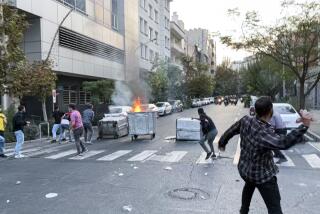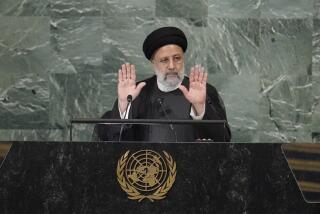In his first major policy speech, Pompeo calls for global anti-Iran coalition

- Share via
Reporting from Washington — The Trump administration, two weeks after it withdrew from an international arms control deal that curbed Iran’s nuclear ambitions, called Monday for a new global coalition to force the Islamic Republic to capitulate to a long list of political and military demands.
In his first major policy address, Secretary of State Mike Pompeo described Iran in uncompromising and combative terms, vowing to enact history’s most draconian sanctions against Tehran and to “crush” its proxy forces across the Mideast.
The administration’s so-called Plan B, as an alternative to the nuclear deal, was less a detailed new policy than a dozen harsh demands, with no clear way to achieve them, that Pompeo said Iran must meet before President Trump would agree to a “new deal.”
The sweeping list would sharply curtail Iran’s ballistic missile program and wider behavior in the region, and require a radical change in policy — if not leadership — in Tehran. Behind the demands lay what Pompeo vowed would be “unprecedented financial pressure” through new sanctions.
“The regime has been fighting all over the Middle East for years,” he said at the Heritage Foundation, a conservative think tank in Washington. “After our sanctions come in force, it will be battling to keep its economy alive.”
Iran quickly denounced Pompeo’s remarks as a call for “regime change,” and some U.S. experts questioned how realistic it was to make strident demands divorced from a broader diplomatic strategy.
“Pompeo has not outlined a strategy, but rather a grab bag of wishful thinking that can only be interpreted as a call for regime change in Iran,” said Suzanne Maloney, an Iran expert at the Brookings Institution.
The address comes as President Trump focuses on a related gambit with nuclear-armed North Korea. South Korean President Moon Jae-in will visit the White House on Tuesday as Trump prepares for a planned June 12 summit in Singapore with North Korea’s ruler, Kim Jong Un, in an effort to persuade him to give up his nuclear arsenal.
In his speech, Pompeo said he expects support from U.S. allies in Europe, as well as a dozen other countries, mostly in the Middle East, for the administration’s Iran policy. He said he did not have a timeline, but that the administration would send envoys around the world in coming weeks to explain the plan.
“We will hold those doing prohibited business in Iran to account,” he said.
He did not mention Russia or China, which both signed the nuclear accord and are unlikely to back greater U.S. sanctions on Iran, a clear weakness in any new crackdown on Iran. Britain, France and Germany also signed the nuclear deal, and after Trump rejected their pleas to stay in it, they are striving to keep it alive without violating U.S. sanctions.
Sanctions would be lifted, Pompeo said, only when Iran withdraws its forces from Syria, ends support for Houthi rebels in Yemen, and disarms Shiite militias in Iraq. He also demanded Iran end support for other militant groups, including Hezbollah in Lebanon, Hamas in the Gaza Strip, and the Palestinian Islamic Jihad.
He also called for a full stop to Iran’s enrichment of uranium, which was sharply curbed by the Iran deal, and for international monitors to gain “unqualified access” to all sites, including military facilities that Iran considers off-limits.
He said the Trump administration would not renegotiate the 2015 nuclear accord. “The Iranian wave of destruction in the region in just the last few years is proof that Iran’s nuclear aspirations cannot be separated from the overall security picture,” he added.
He repeatedly called Iran the world’s largest state sponsor of terrorism, saying it antagonizes neighbors, represses its own people and imperils peace worldwide.
Pompeo echoed Trump’s complaints about the Obama-era nuclear deal, saying it had “fatal flaws” because some elements had time limits and it focused only on Iran’s nuclear program, not its other problematic behavior.
“The bet that [the nuclear deal] would increase Middle East stability was a bad one for America, for Europe, for the Middle East, and indeed for the entire world,” he said.
Any new agreement would ensure that Iran “never acquires a nuclear weapon, and will deter the regime’s malign behavior in a way the [2015 deal] never could,” he said.
It was no accident that Pompeo, who served in the House of Representatives before Trump named him to head the CIA last year, chose the fraught topic of Iran for his first policy speech. A longtime congressional opponent of the nuclear accord, he reverted to that hawkish posture Monday, evoking a time when he said the United States could bomb away Iran’s nuclear program with “under 2,000 sorties.”
In his Senate confirmation hearing last month, Pompeo said he saw no evidence that Iran was seeking to build a nuclear bomb given the constraints of the 2015 arms control deal. But on Monday, he warned that once restrictions in the deal expire, Iran “would be free for a quick sprint to the bomb — setting off a potentially catastrophic arms race in the region.”
He insisted diplomacy was the first choice, however.
“We’re open to new steps with not only our allies and partners, but with Iran as well,” he said. “But only if Iran is willing to make major changes.”
Longtime opponents of the Iran deal said Pompeo’s plans were ambitious but they welcomed “maximum pressure” and muscular diplomacy to push Iran to do America’s bidding. Others worried that Pompeo was forcing Iran into a corner, one likely to raise tensions in the region.
“It’s hard to imagine that Pompeo or anyone else thinks this is actually going to happen,” said Benjamin Friedman, a fellow at the conservative Defense Priorities think tank in Washington. “It seems to be an intentional way to get into a confrontation with Iran.”
Pompeo’s speech “has not demonstrated how walking away from the [nuclear deal] will make the region safer from the threat of nuclear proliferation or how it puts us in a better position to influence Iran’s conduct,” Federica Mogherini, the European Union’s top foreign affairs official, said in a statement issued in Brussels.
“Pompeo’s remarks today make it very clear: Trump has no strategy,” said Trita Parsi, president of the National Iranian-American Council, which favors rapprochement with Tehran.
Parsi called the speech “a long list of complaints that end with demands that everyone in the policy community knows are non-starters.” He added, “This will only lead to one thing: Confrontation. And one cannot help but think that is the strategy and the goal.”
For more on international affairs, follow @TracyKWilkinson on Twitter
More to Read
Sign up for Essential California
The most important California stories and recommendations in your inbox every morning.
You may occasionally receive promotional content from the Los Angeles Times.











